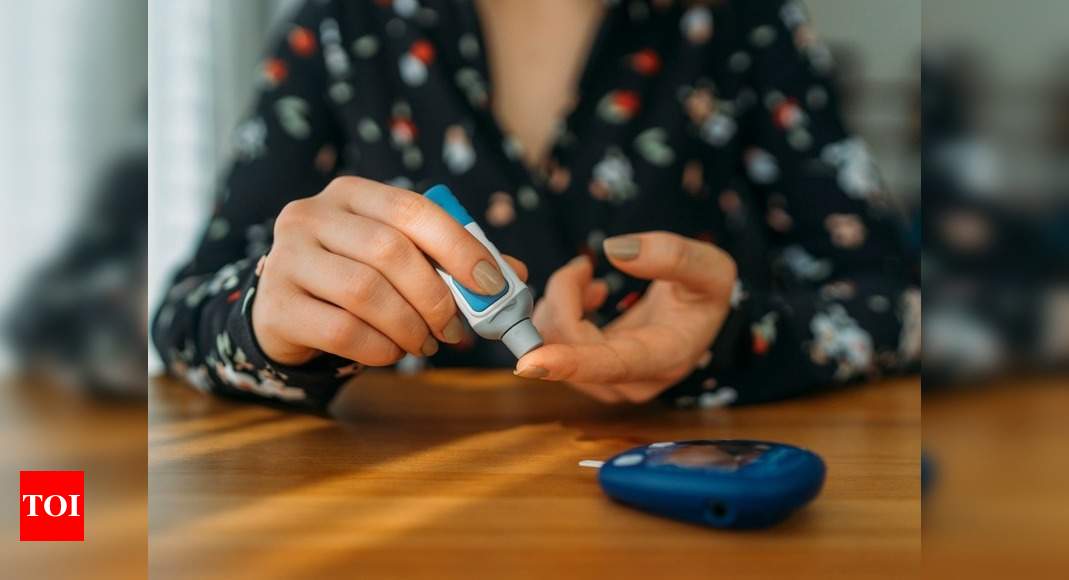
Diabetes is a scary disease to battle, and it’s sad to think that the worldwide prevalence of diabetes is increasing every single day, with India recording a high number of cases. As a condition, diabetes can also invite other health problems, COVID-19 being one of them.
COVID-19 is a condition which gets worse with co-morbidities. Researches pin that people suffering from diabetes suffer from worse outcomes, have a high risk for severity and long recovery time.
A recent study conducted by King’s College, London, found that patients who had a condition called ‘diabetic retinopathy’ faced a higher risk for COVID hospitalization, and five times more likely to be administrated ventilator support.
Retinopathy, which is marked by damage to the blood vessels around the eyes is a common complication with Type-1 and Type-2 diabetes. In many cases, blood vessel damage can also lead to organ damage in other parts of the body. It’s only now, that doctors are realizing, what other grave damage could be resultant from the same- one of them being severe COVID-19 and prolonged recovery.
From managing blood sugar flare-ups to preventing organ damage, what makes diabetes such a bad comorbidity for COVID-19? We asked a few doctors to weigh in on the same.
Diabetes as a condition: What makes it so difficult to manage?
The risk for COVID-19 weighs heavily upon those who suffer from pre-existing medical conditions and frail immunity.
It also requires you to take preventive steps to safeguard your immune system.
When a person suffers from diabetes, it doesn’t simply affect the body’s blood glucose levels but also compromises the insulin production levels in the body. When it goes for a spin, it can have lasting complications, especially on the immunity. People with high or unmanaged blood sugar levels have less than normal blood flow, which makes it difficult for the body to harness nutrients, natural defences meant to protect the body against several infections and promote healing. Hence, it usually takes a little longer than usual for people with diabetes to recover as well.
Dr Snehal Tanna, Diabetologist & Diabetic Foot Specialist at Jupiter Hospital terms COVID-19 for diabetic patients ‘a pandemic over an already existing battle’.
“For patients with unmanaged blood sugar levels, safeguarding immunity and preventing infection risk can be a tricky situation. For even the ones who have good control over their sugar levels, a small bout of infection could mean increased stress resulting in high glucose levels. Underlying co-morbidities apart from sugar levels could also pose a risk to managing COVID-19.”
Dr Bharat Agarwal, Consultant, Internal Medicine, Apollo Hospitals, Navi Mumbai adds that diabetes not only lowers your immunity but also increases the risk factors for the development of secondary infections. He adds:
“Diabetes is an immuno-suppressant condition, meaning, it decreases your immunity. It can also invite other diseases and make it harder to fight off a germ as lethal as COVID-19. What we also see is that diabetics also have underlying vascular phenomenon, which means they are susceptible to problems like cardiovascular lapses, respiratory decline, chronic lung diseases which add to the risk and make recovery from an infection much more difficult.”
With a disease as threatening as COVID-19, Dr Agarwal also warns that diabetic patients face an added risk of developing COVID-19 pneumonia, which is a known complication with the viral infection and a leading cause of death in many COVID cases.
Adds Dr Sandeep Budhiraja, Senior Director, Institute of Internal Medicine, Max Healthcare, “Diabetic patients suffering from any viral disease must also be attended to at once because the pre-existing condition can make it difficult for the body to beat the infection naturally, if not taken care of in time. It can manifest into severe complications such as pneumonia and kidney failure (which have been linked to COVID-19 deaths). The immune system is already compromised, which makes it easier for viruses to thrive in the body amidst high blood glucose levels. Plus, with bad inflammation levels, it can also compromise your diabetes diagnosis. The risk exists for people suffering from both Type-1 and Type-2 diabetes.
Diabetics face risk post-recovery too
For those who recover from the virus, it’s not just the risk of infection which makes diabetic patients scared.
A lot of diabetic patients, who have recovered from the virus continue to experience problems and fluctuations with their insulin levels. From absolutely low sugar levels to an unusually high sugar reading- managing diabetes level, in the long run, can pose problems too.
Dr Agarwal adds, “Patients who have been hospitalised with COVID, either for moderate or severe forms of infection are given steroids, which influences readings. What we also see is that the insulin requirement goes up tremendously in the acute phase of the illness, due to possible stress and inflammation.”
Dr Tanna also adds that diabetic patients who have made a successful recovery must remain considerate about follow-ups, insulin dosage and vital parameters.
“Glucose levels take time to come under control in post-recovery phase, which is why at times multiple oral drugs are administered and strict monitoring of glucose levels, with frequent alterations in anti-diabetic medications, is suggested. “
Some patients may also benefit from the usage of insulin injections to control the post-infection control surge. However, doctors do add a warning of caution that people with diabetes need to weigh in the risk of predisposition to post COVID complications and something they need to duly keep their doctors in the loop about as well.
Managing diabetes with COVID-19: What preventive steps can you take?
The better in charge you are of keeping your blood sugar in check, the better you can keep COVID-19 at bay. Even after battling a brush with COVID-19, patients need to follow preventive steps to keep themselves healthy and recover faster.
Since blood sugar levels can be brittle during this phase and impact immunity, make sure you drink plenty of fluids and prevent dehydration.
It is also important that you take care of and avoid minor cuts and bleeds. Foot hygiene, along with hand hygiene should not be ignored at this vulnerable time. Meticulous skin care can ensure that cuts and bleeds do not turn into major infections which impact blood flow.
Lastly, do not treat this as a time to ignore lifestyle modifications- sleep well, exercise well (even if at home) and eat right, all of which can help keep your immunity healthy.
read the full story about What makes diabetes a bad comorbidity for COVID-19?
#theheadlines #breakingnews #headlinenews #newstoday #latestnews #aajtak #ndtv #timesofindia #indiannews




